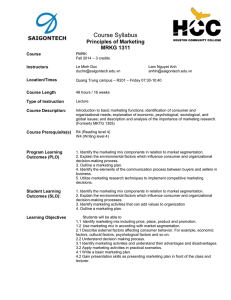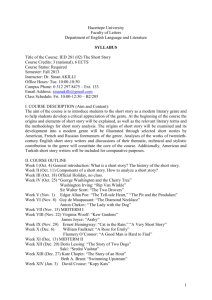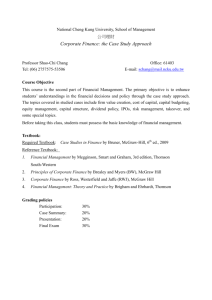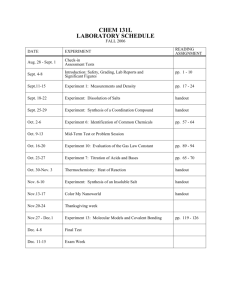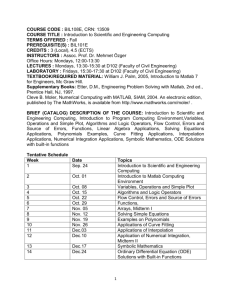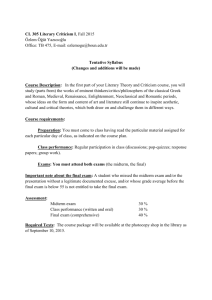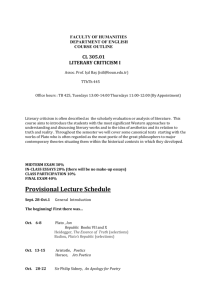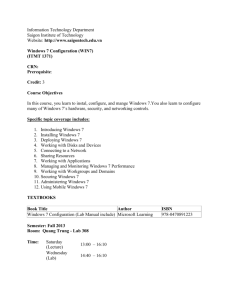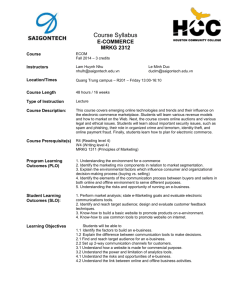middle east technical university spring 1996
advertisement
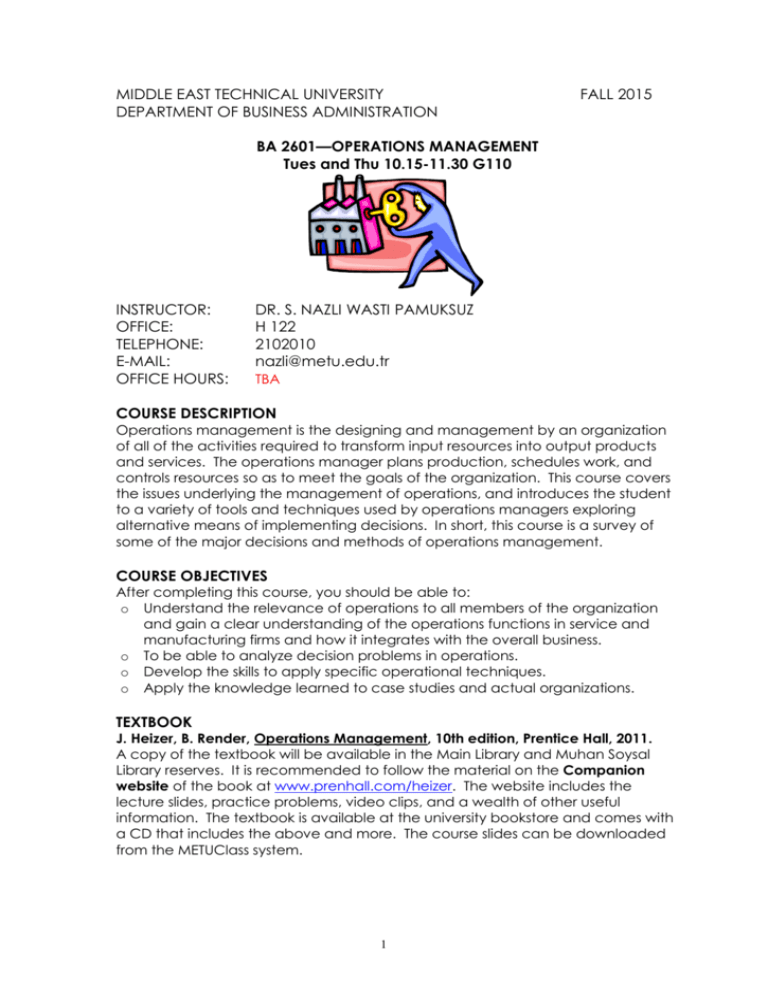
MIDDLE EAST TECHNICAL UNIVERSITY DEPARTMENT OF BUSINESS ADMINISTRATION FALL 2015 BA 2601—OPERATIONS MANAGEMENT Tues and Thu 10.15-11.30 G110 INSTRUCTOR: OFFICE: TELEPHONE: E-MAIL: OFFICE HOURS: DR. S. NAZLI WASTI PAMUKSUZ H 122 2102010 nazli@metu.edu.tr TBA COURSE DESCRIPTION Operations management is the designing and management by an organization of all of the activities required to transform input resources into output products and services. The operations manager plans production, schedules work, and controls resources so as to meet the goals of the organization. This course covers the issues underlying the management of operations, and introduces the student to a variety of tools and techniques used by operations managers exploring alternative means of implementing decisions. In short, this course is a survey of some of the major decisions and methods of operations management. COURSE OBJECTIVES After completing this course, you should be able to: o Understand the relevance of operations to all members of the organization and gain a clear understanding of the operations functions in service and manufacturing firms and how it integrates with the overall business. o To be able to analyze decision problems in operations. o Develop the skills to apply specific operational techniques. o Apply the knowledge learned to case studies and actual organizations. TEXTBOOK J. Heizer, B. Render, Operations Management, 10th edition, Prentice Hall, 2011. A copy of the textbook will be available in the Main Library and Muhan Soysal Library reserves. It is recommended to follow the material on the Companion website of the book at www.prenhall.com/heizer. The website includes the lecture slides, practice problems, video clips, and a wealth of other useful information. The textbook is available at the university bookstore and comes with a CD that includes the above and more. The course slides can be downloaded from the METUClass system. 1 COURSE REQUIREMENTS To prepare for class discussion, please read the assigned chapters carefully prior to coming to class. Use the study questions supplied in the book as a guide. Be prepared to be called-upon to provide definitions or examples. Students who have not submitted their Student Information Sheet at (in METUClass system) and returned it to me by with a photo attached/embedded by October 15, 2015, will NOT receive a participation grade. Depending on teaching assistant (TA) support available, we will have recitation hours to help you with specific applications of the methods in the course. Attending recitation hours is optional, but strongly recommended. The exams will be true-false and multiple choice. GRADING SCHEME (approximate weights): Midterms 95% Class participation 5% This course does not have a final exam. TENTATIVE MIDTERM DATES: Nov 9, Dec 7, and Jan 7 (5.45 pm). Makeup exams will not be given unless your excuse has been accepted by the instructor. TENTATIVE COURSE OUTLINE We have a lot of topics to cover so based on our pace, adjustments may be required in the schedule. Oct. 6-8 Oct. 13-15 Oct. 20-22 Oct. 27 Nov. 3-5 Nov. 9 Nov. 10-12 Nov. 17-19 Nov. 24-26 Dec. 1-3 Dec. 7 Dec. 8-10 Dec. 15-17 Introduction (Chapters 1 and 2), OM in Hard Rock Café video, OM at Frito-Lay video Forecasting (Chapter 4) (NO CLASS ON OCT. 29) Process strategy (Chapter 7), Process Strategy and Selection video, Process Analysis at Arnold Palmer Hospital video, Service Process Matrix video, RFID video, AGV video Location strategies (Chapter 8), Where to Place Hard Rock's Next Café video, Locating the Next Red Lobster Restaurant video (NO CLASS ON OCT. 29) Layout strategies (Chapter 9), Layout of the Arnold Palmer Hospital’s New Facility video Midterm 1—Chps. 1, 2, 4, 7, 8, 9 Managing quality (Chapter 6), The Culture of Quality at Arnold Palmer Hospital video, Quality at the Ritz-Carlton Hotel Co. (Nov. 10 class begins at 10.30 am) Statistical process control (Supplement 6), Darden Restaurants video, Frito-Lay QC video, SPC exercise Inventory management (Chapter 12), Managing Inventory at Frito Lay video, “He Shoots, He Scores” game. Aggregate planning (Chapter 13) Midterm 2, 17.45 (Chapters 6, S6, 12, 13) MRP and ERP (Chapter 14) Short term scheduling (Chapter 15) 2 Dec. 22-24 Dec. 29-Jan. 5 Jan. 7 JIT and lean production systems (Chapter 16), JIT at Arnold Palmer video, Lean manufacturing game, Honda & Visa ad videos Project management (Chapter 3), Project Management at Arnold Palmer Hospital video, Managing Hard Rock’s Rockfest video, project management game Midterm 3, 17.45 (Chapters 14, 15, 16, 3) CIVILITY IN THE CLASSROOM Students are expected to assist in maintaining a classroom environment conducive to learning. Unless otherwise approved by the instructor, students are prohibited from arriving late, using cellular phones, eating, or engaging in any other form of distraction. GOOD LUCK AND ENJOY THE CLASS! Middle East Technical University Department of Business Administration Rules of Academic Honesty February 2004 Cheating: All university, faculty, and department principles on academic honesty will be strictly enforced. The usual consequence for academic dishonesty is failure in the course and additional disciplinary action. Examinations are individual and are to be completed without unauthorized outside assistance. Persons observed cheating during examinations will automatically receive a failing grade in the course. Homework assignments are individual, unless otherwise specified by the instructor, and are to be completed without unauthorized outside assistance as well. Persons observed cheating in their homework assignments will receive a score of zero for the portion of the semester grade that is allocated to such assignments. In addition to the consequences above, the instructor will initiate disciplinary action against the student(s) involved in academic dishonesty. Plagiarism: The instructor assumes that students will do their own work. By placing their names (individual or team) on assignments, students are affirming that the contents are their original work. Ideas should be stated in the student’s own wording. Violation of this provision will be considered as unethical behavior, subject to disciplinary action. If you have any doubt about the use of a specific material, see the instructor ahead of time. Civility in the Classroom: Students are expected to assist in maintaining a classroom environment which is conducive to learning. In order to assure that all students have an opportunity to gain from time spent in class, students are prohibited from using cellular phones or beepers, eating or drinking in class, arriving late or leaving early without prior permission, or engaging in any other form of distraction. Inappropriate behavior in classroom shall result in, minimally, a request to leave class. Examination Rules: Students must present a valid METU Student ID before they can be allowed into the examination rooms. Those students who cannot present this ID will not be allowed into the examination room under any circumstances. Cellular phones must be turned off and stowed away during the examinations. Students whose phones are observed to be turned on and/or not stowed away will receive a score of zero for the examination. 3
